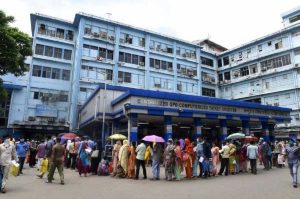Kolkata SSKM Hospital Minor Assault Case: A shocking incident at Kolkata’s Seth Sukhlal Karnani Memorial (SSKM) Hospital has raised serious concerns about patient safety inside one of West Bengal’s busiest government medical institutions. A 15-year-old girl visiting the Trauma Care Centre for medical treatment was allegedly sexually assaulted by a former hospital employee who gained unauthorized access to restricted areas while posing as a staff member.

The crime has revealed significant gaps in safety protocols, security vetting, and surveillance monitoring within the hospital campus — a place where vulnerable patients should feel protected while receiving essential healthcare.
What Happened at SSKM Hospital
According to police investigations, the accused approached the minor girl and her grandfather, claimed to be a hospital staff member, and misled them. He then allegedly took the girl to a male washroom near the MRI/CT diagnostic block and sexually assaulted her.
Authorities acted swiftly afterward:
- The accused was detained and subjected to medico-legal procedures.
- CCTV footage confirmed his suspicious movements.
- The court remanded him to police custody for further inquiry.
- The hospital issued a show-cause notice to the private security agency responsible for entry-point screening.
Hospital Overcrowding and Weak Entry Screening
SSKM is among the most crowded public hospitals in Eastern India. Thousands arrive daily for treatment, resulting in:
✔ Unregulated entry flow
✔ Visitors blending in with staff
✔ Multiple uncontrolled gates
✔ Inadequate security staff deployment
✔ Insufficient identity checks
SSKM is officially affiliated with IPGMER — a prestigious government teaching and referral hospital, yet its structural vulnerabilities create room for such breaches.
✅ Official reference:
IPGMER & SSKM Hospital, Govt. of West Bengal
https://www.wbhealth.gov.in
A Critical Breakdown of Patient Trust
For the minor survivor and her family, the traumatic incident has caused emotional distress and fear. Families visiting hospitals expect:
- Safe access to healthcare
- Security for minors
- Professional conduct by staff
- Institutional accountability
However, the incident has shaken public confidence, especially among guardians of young patients.
Public hospitals serve people who have no alternative and no financial privilege. Therefore, ensuring strong protections is not optional — it is a human rights obligation.
Kolkata SSKM Hospital Minor Assault Case: Legal Perspective: POCSO Act Applied
Since the survivor is a minor, the case is being prosecuted under:
🔹 Protection of Children from Sexual Offences (POCSO) Act, 2012
Government resource: https://wcd.nic.in/pocso-act-2012
The Act mandates:
- Fast-track trial
- Victim counselling and rehabilitation
- Strict punishment for assault within institutional care
Hospitals, under Indian healthcare regulations, are legally compelled to protect vulnerable patients within their premises.
Why Government Hospitals Are Vulnerable
A review of similar past cases reveals recurring issues:
| Issue | Impact |
|---|---|
| Overcrowding | Difficult to monitor unauthorized persons |
| Limited CCTV real-time supervision | Suspicious movement not detected early |
| Security outsourced to private agencies | Accountability gaps |
| Staff identity confusion | Imposters blend with medical workers |
| Inadequate architectural safety | Risky isolated zones like washrooms |
A security-first healthcare framework is necessary to prevent crimes on campus.
Hospital Administration Under Pressure
While SSKM management has promised corrective action, critics accuse the administration of being reactionary, not preventive.
Expected reforms include:
1️⃣ Upgrading entry controls with ID scanning
2️⃣ Monitoring isolated areas through live CCTV
3️⃣ Deploying trained protection units for minors
4️⃣ Ensuring visible, accessible complaint desks
5️⃣ Auditing all staff and contract workers
6️⃣ Secure, supervised routes to washrooms and diagnostics
These changes must be ensured immediately, not after multiple tragedies.
Government Accountability
The State Health Department is now under scrutiny.
Healthcare governance guidelines:
- Ministry of Health & Family Welfare
https://main.mohfw.gov.in - National Health Mission, West Bengal
https://nhm.gov.in
Civil society groups demand:
✅ Public safety audit reports
✅ Liability determination of guards and management
✅ Survivor-support funds and counselling
✅ Policies for zero-tolerance in institutional crime
The administration must share findings transparently with the citizens who depend on these hospitals.
A Turning Point for Public Hospital Security
The SSKM case highlights the urgent need for:
🌐 Digital visitor management
🎥 CCTV + human surveillance integration
🛑 Restricted access zones near labs and critical units
🏥 Hospital staff identity protocol enforcement
👮 Specialized healthcare security unit
A hospital should be a healing space, not a place where families fear for their children’s safety.
Conclusion
The alleged assault at SSKM Hospital is a grim reminder of systemic flaws within government-run healthcare institutions in West Bengal and across India. It is not just a police case — it is a wake-up call for health governance.
Every patient — especially minors — deserves:
✔ Safety
✔ Dignity
✔ Protection from harm inside medical campuses
Justice for the survivor must be matched by institutional reform, ensuring no family has to endure such trauma again.
✅ External Government / Authoritative Links Added:
- Ministry of Health & Family Welfare (India): https://main.mohfw.gov.in
- West Bengal Health & Family Welfare Department: https://www.wbhealth.gov.in
- National Health Mission: https://nhm.gov.in
- POCSO Act (Child Protection Law): https://wcd.nic.in/pocso-act-2012
- Hub for Patient Safety Research & Advocacy: https://nabh.co
Also read: Home | Channel 6 Network – Latest News, Breaking Updates: Politics, Business, Tech & More

